Thomas James Richards, Diaries, Transcript Vol. 2 - Part 27
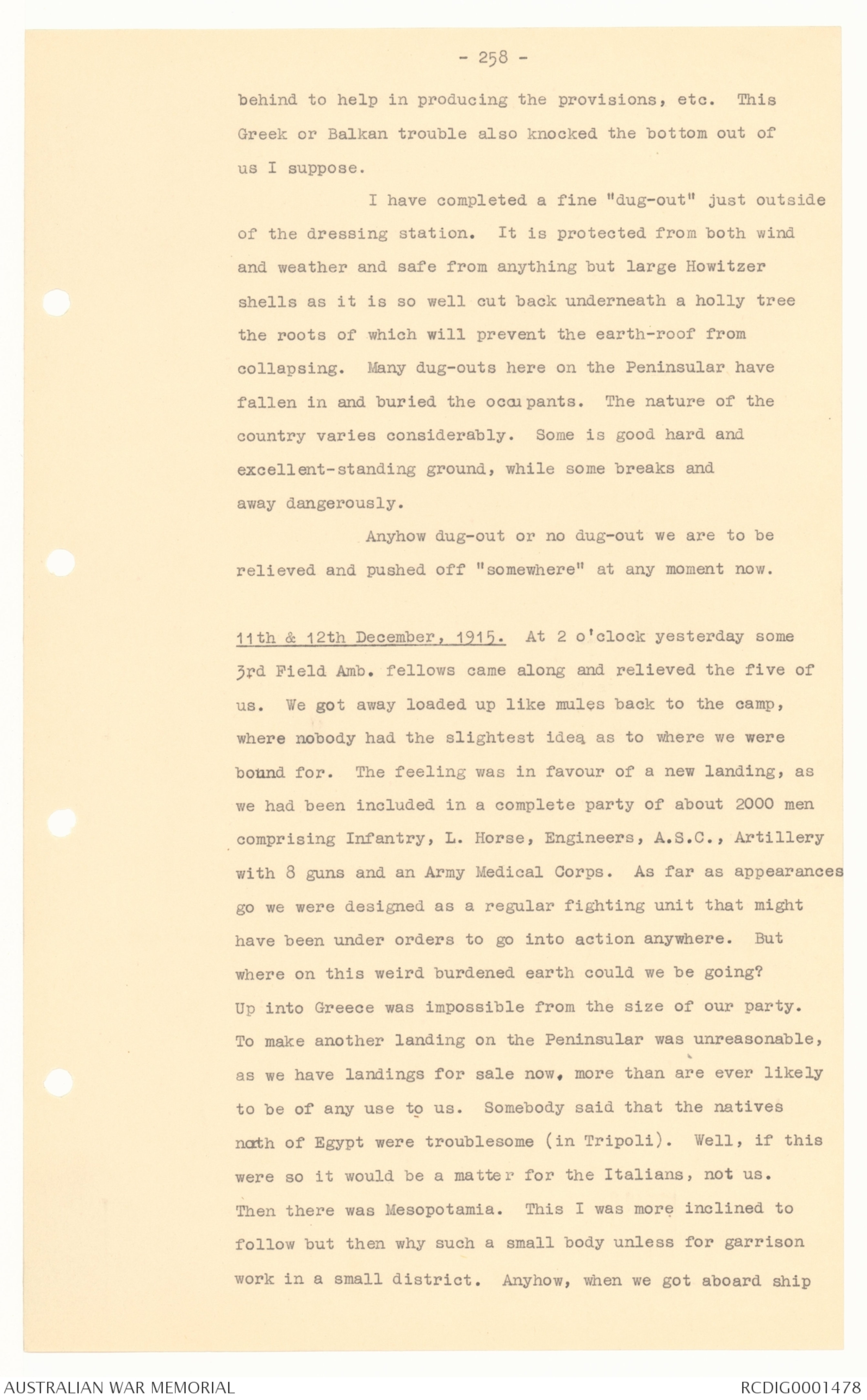
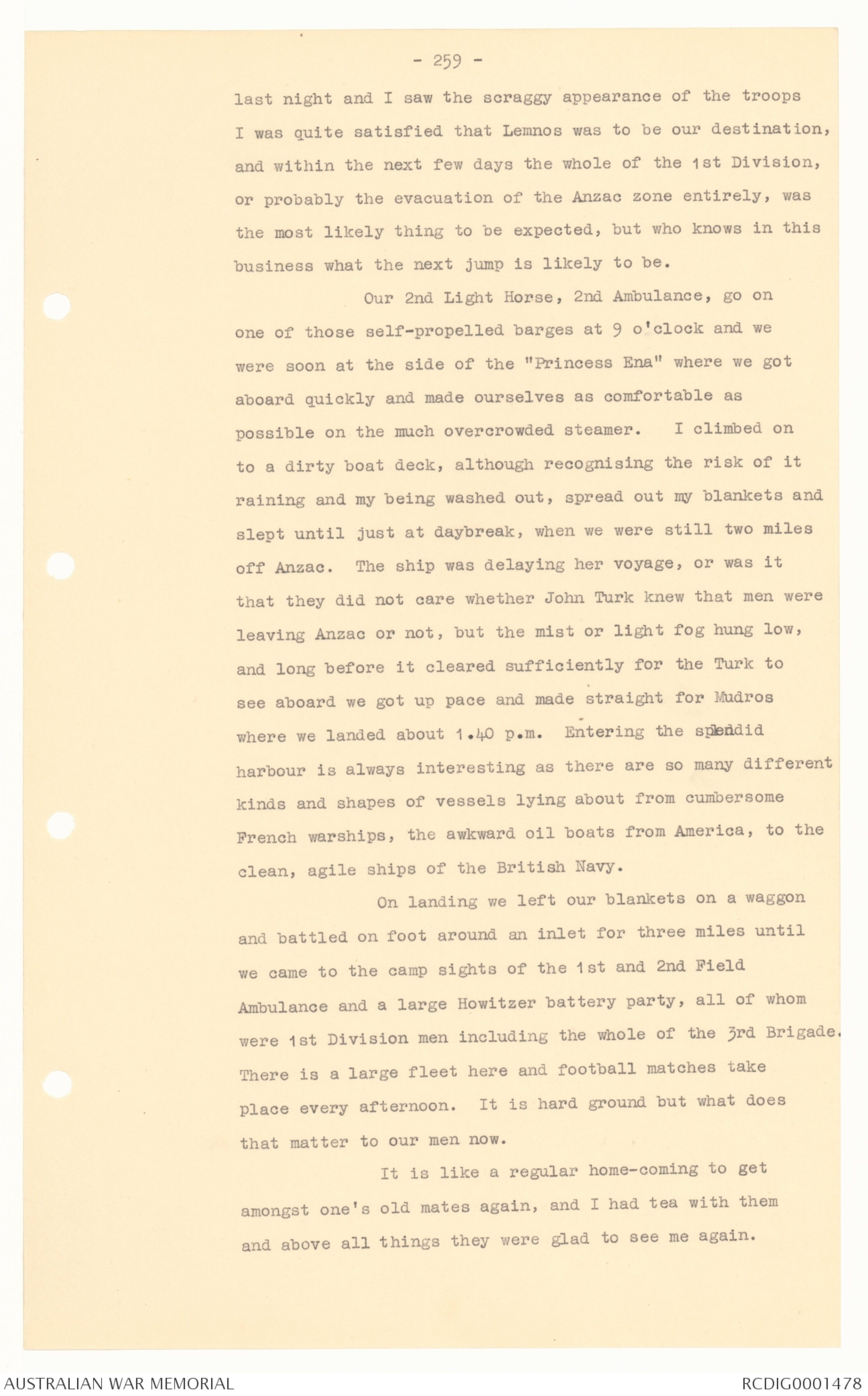
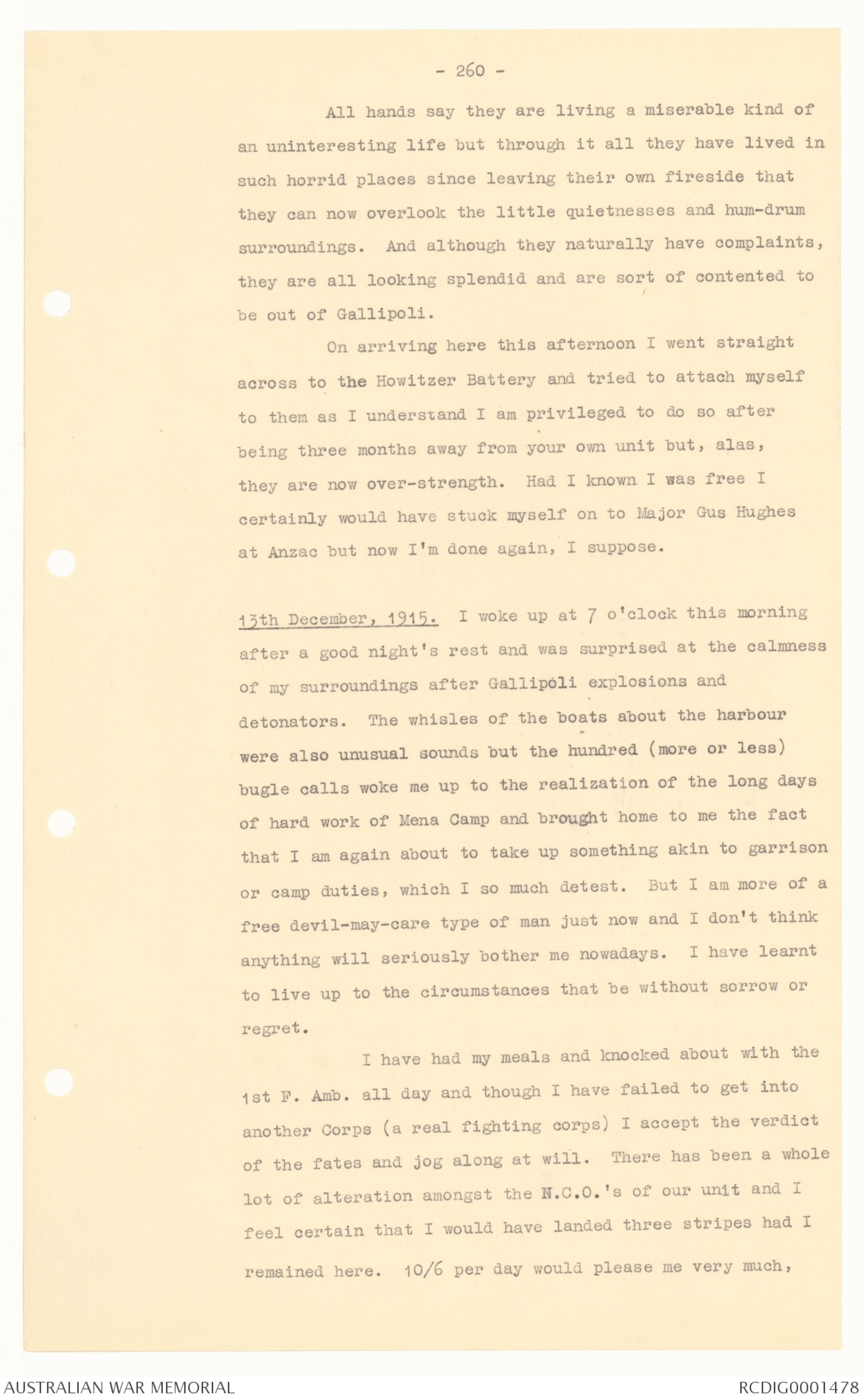
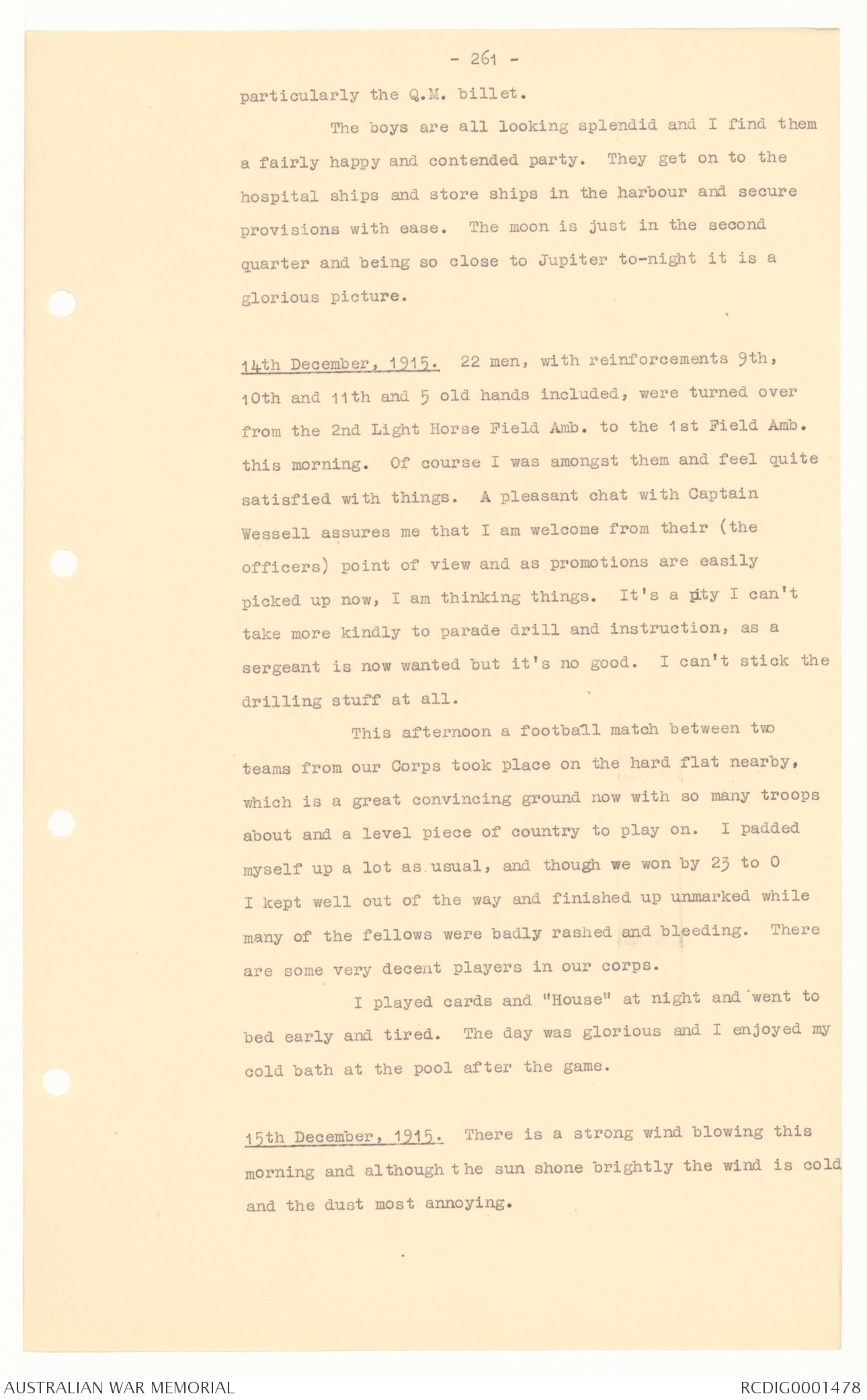
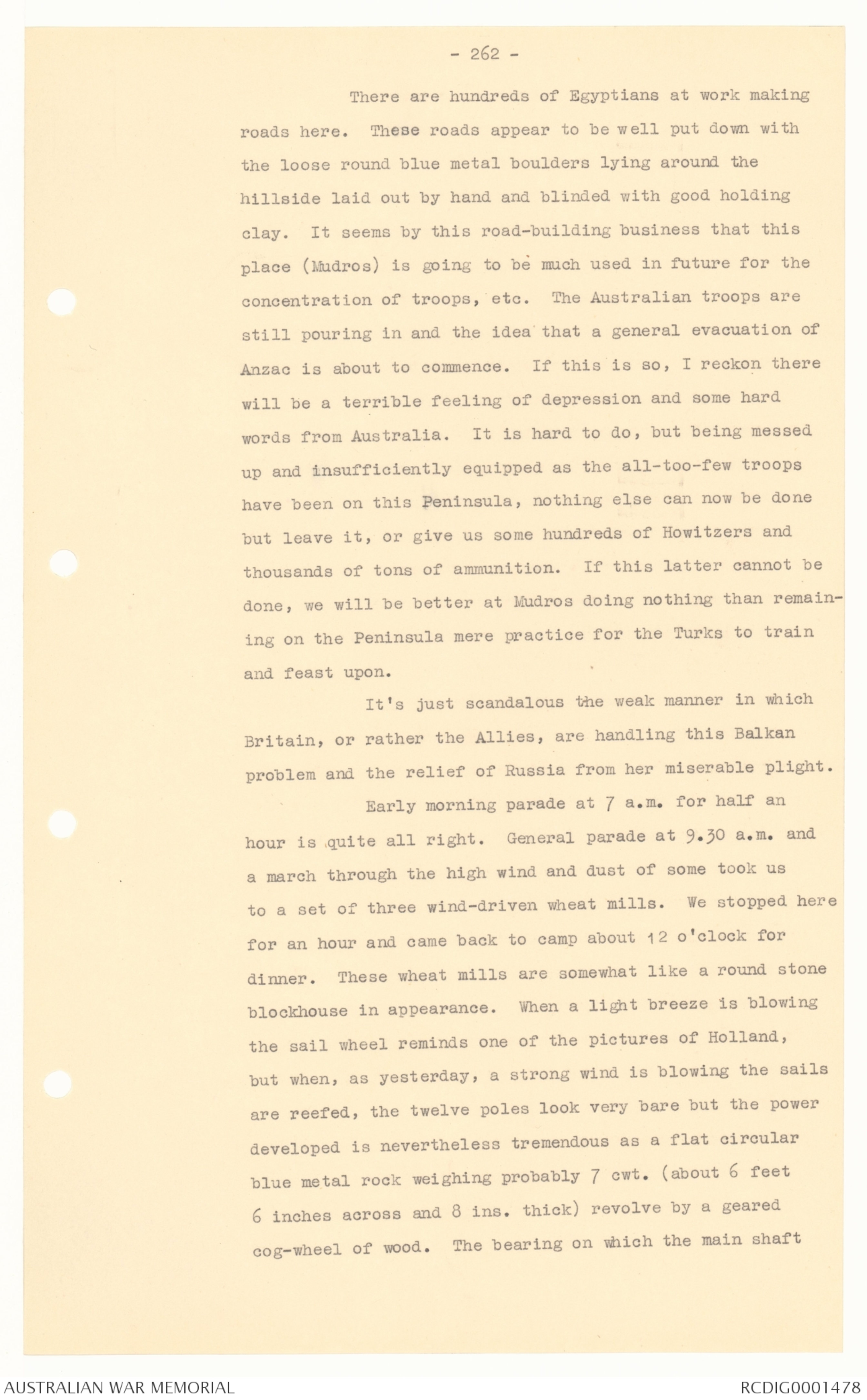
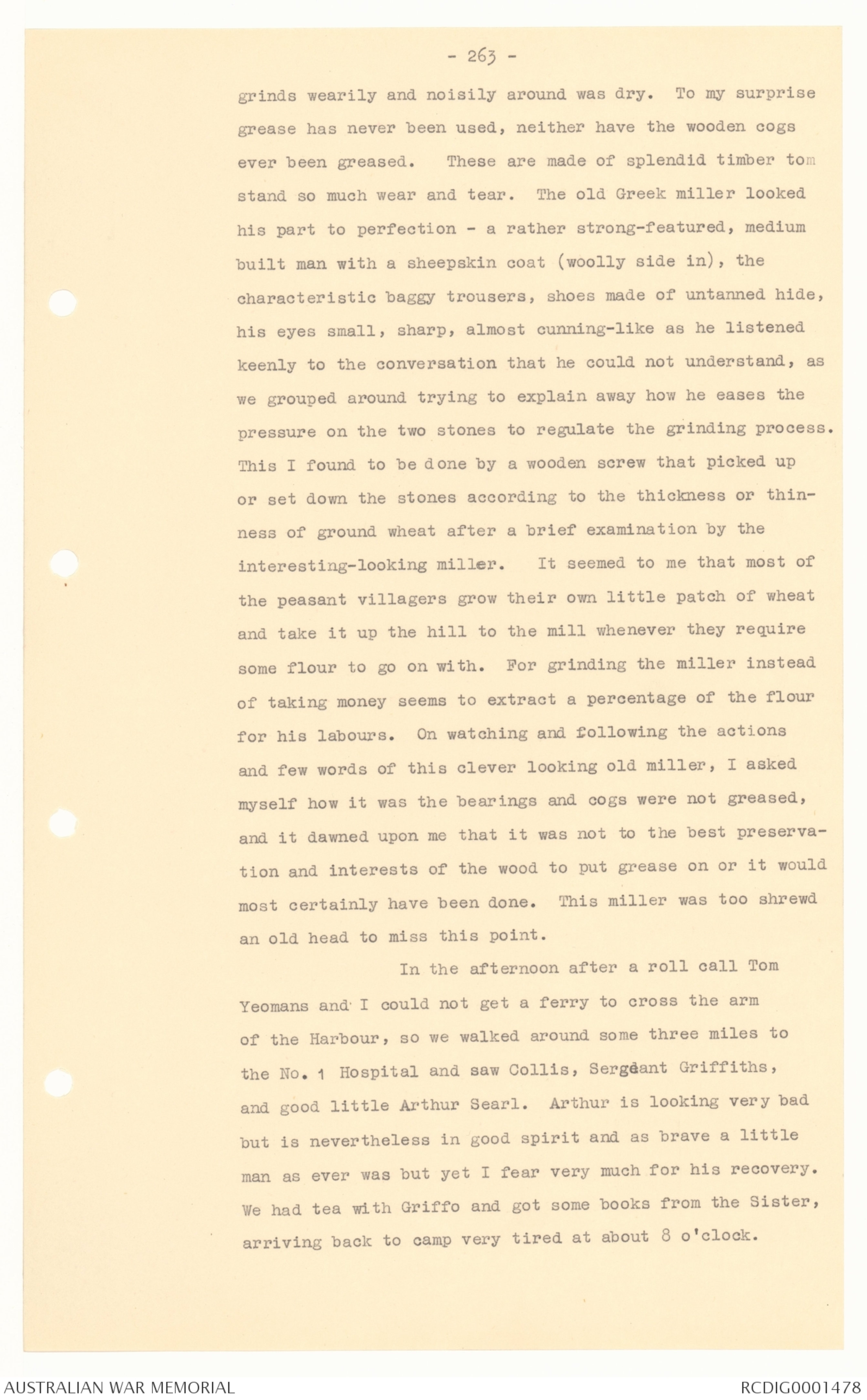
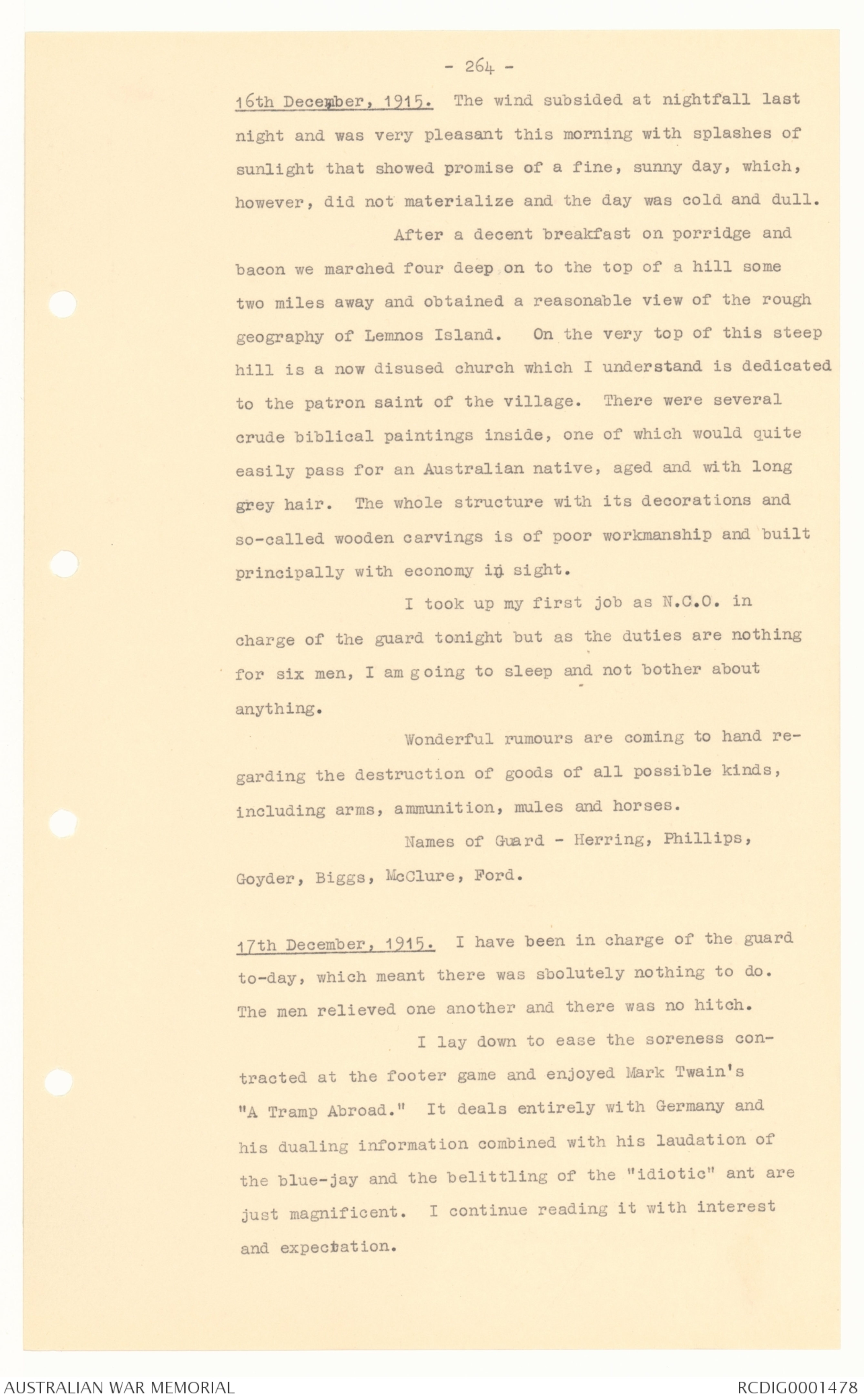
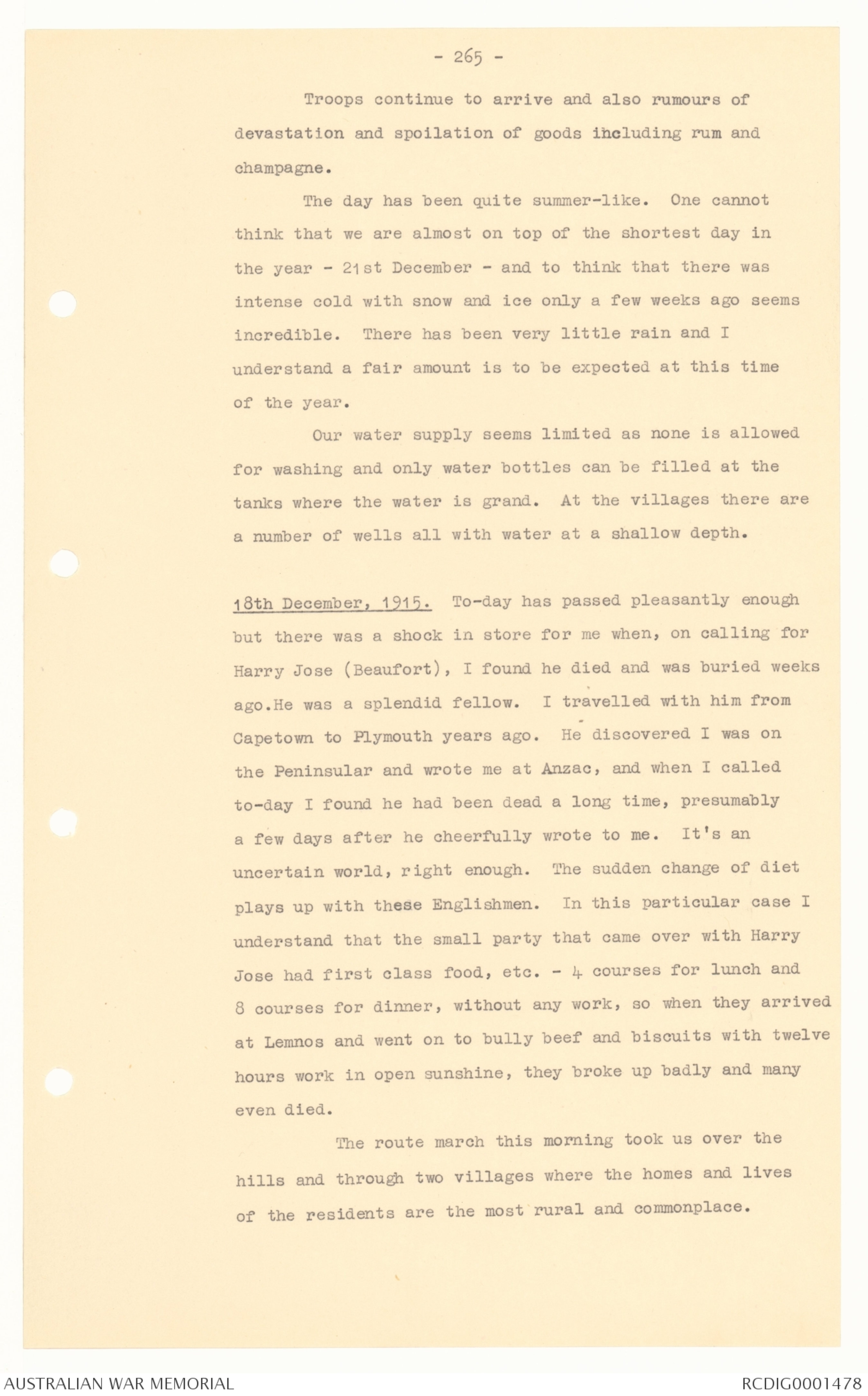
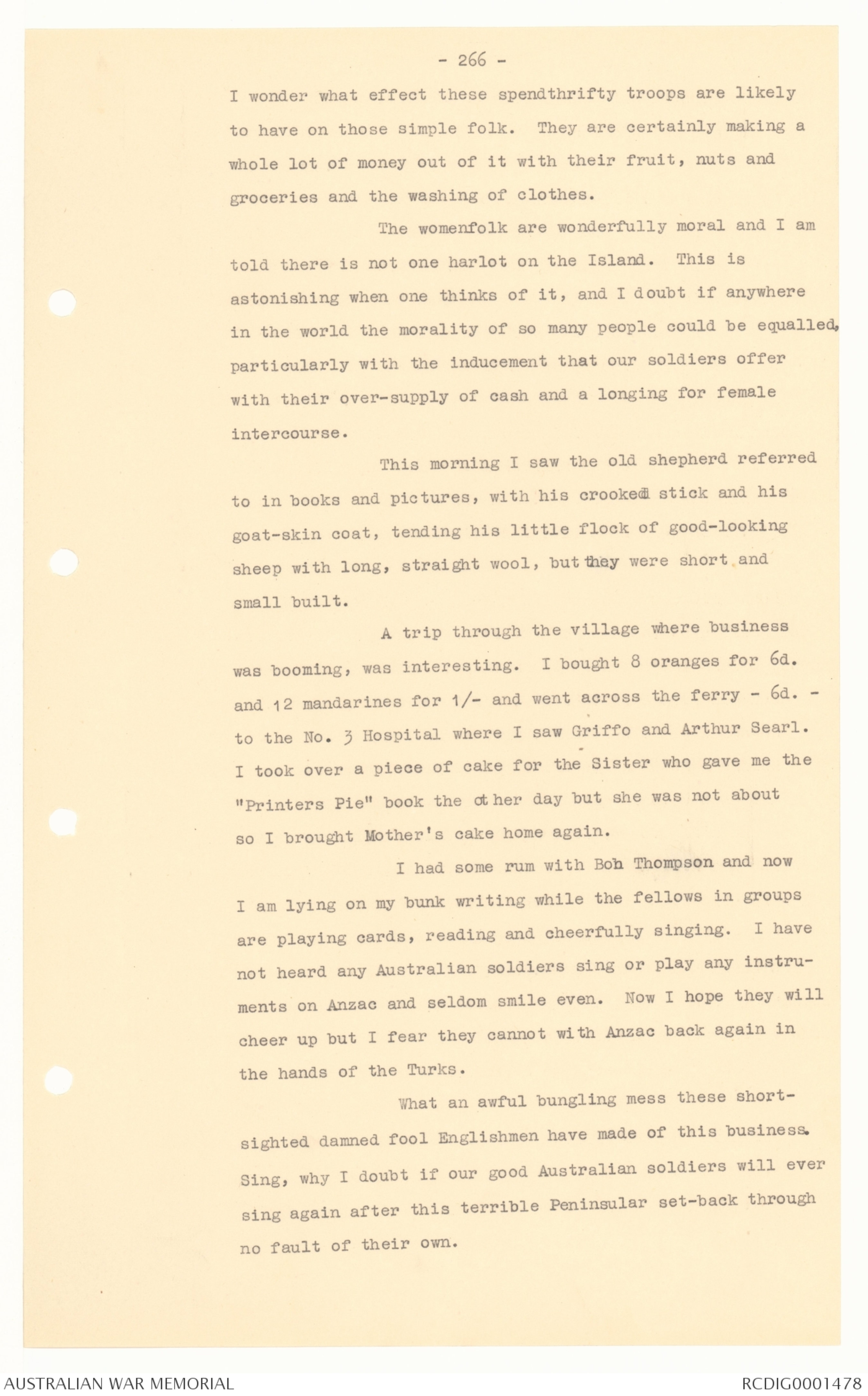
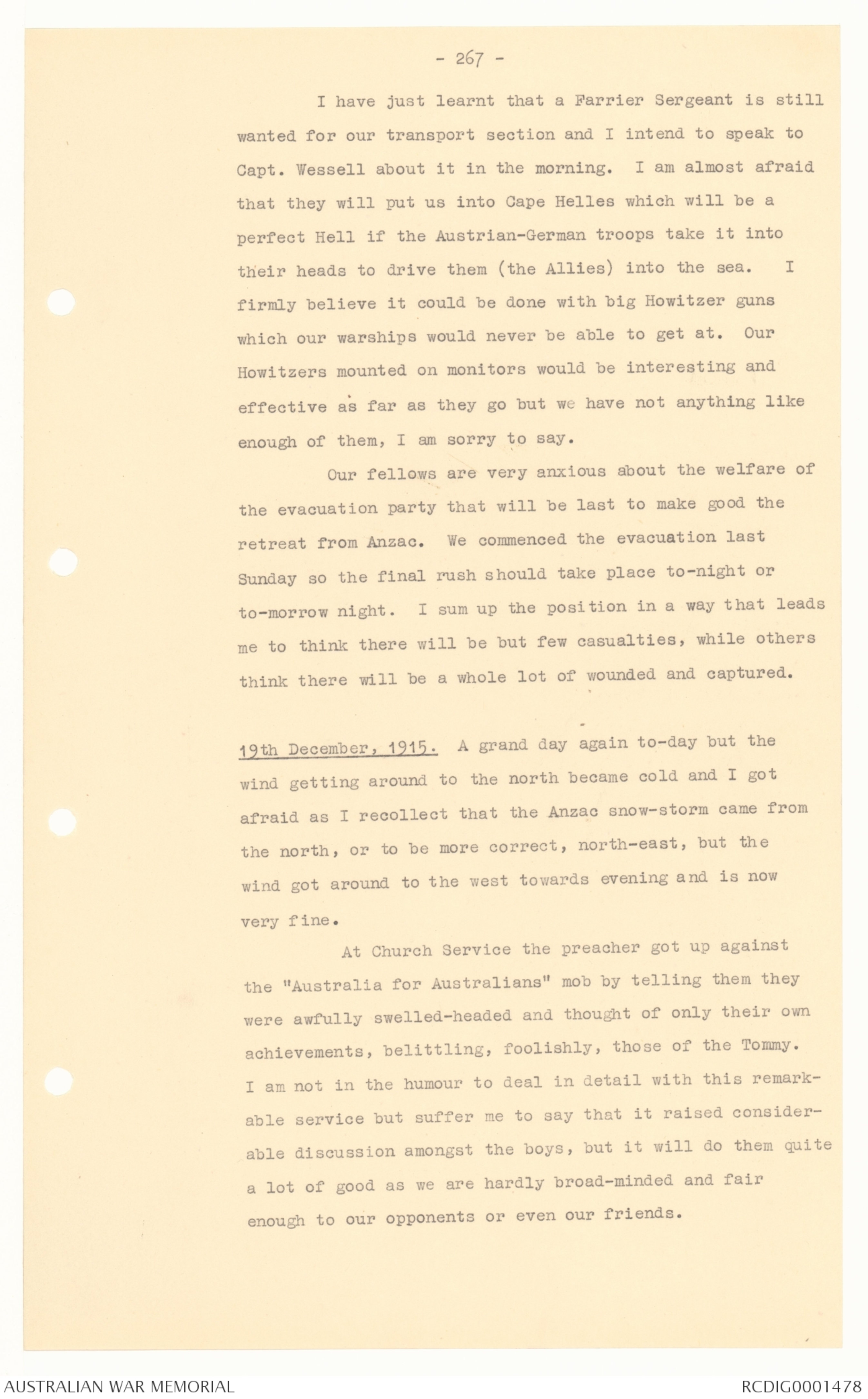
- 258 -
behind to help in producing the provisions, etc. This
Greek or Balkan trouble also knocked the bottom out of
us I suppose.
I have completed a fine "dug-out" just outside
of the dressing station. It is protected from both wind
and weather and safe from anything but large Howitzer
shells as it is so well cut back underneath a holly tree
the roots of which will prevent the earth-roof from
collapsing. Many dug-outs here on the Peninsular have
fallen in and buried the occupants. The nature of the
country varies considerably. Some is good hard and
excellent-standing ground, while some breaks and
away dangerously.
Anyhow dug-out or no dug-out we are to be
relieved and pushed off "somewhere" at any moment now.
11th & 12th December, 1915. At 2 o'clock yesterday some
3rd Field Amb. fellows came along and relieved the five of
us. We got away loaded up like mules back to the camp,
where nobody had the slightest idea as to where we were
bound for. The feeling was in favour of a new landing, as
we had been included in a complete party of about 2000 men
comprising Infantry, L. Horse, Engineers, A.S.C., Artillery
with 8 guns and an Army Medical Corps. As far as appearances
go we were designed as a regular fighting unit that might
have been under orders to go into action anywhere. But
where on this weird burdened earth could we be going?
Up into Greece was impossible from the size of our party.
To make another landing on the Peninsular was unreasonable,
as we have landings for sale now, more than are ever likely
to be of any use to us. Somebody said that the natives
north of Egypt were troublesome (in Tripoli). Well, if this
were so it would be a matter for the Italians, not us.
Then there was Mesopotamia. This I was more inclined to
follow but then why such a small body unless for garrison
work in a small district. Anyhow, when we got aboard ship
- 259 -
last night and I saw the scraggy appearance of the troops
I was quite satisfied that Lemnos was to be our destination,
and within the next few days the whole of the 1st Division,
or probably the evacuation of the Anzac zone entirely, was
the most likely thing to be expected, but who knows in this
business what the next jump is likely to be.
Our 2nd Light Horse, 2nd Ambulance, go on
one of those self-propelled barges at 9 o'clock and we
were soon at the side of the "Princess Ena" where we got
aboard quickly and made ourselves as comfortable as
possible on the much overcrowded steamer. I climbed on
to a dirty boat deck, although recognising the risk of it
raining and my being washed out, spread out my blankets and
slept until just at daybreak, when we were still two miles
off Anzac. The ship was delaying her voyage, or was it
that they did not care whether John Turk knew that men were
leaving Anzac or not, but the mist or light fog hung low,
and long before it cleared sufficiently for the Turk to
see aboard we got up pace and made straight for Mudros
where we landed about 1.40 p.m. Entering the splendid
harbour is always interesting as there are so many different
kinds and shapes of vessels lying about from cumbersome
French warships, the awkward oil boats from America, to the
clean, agile ships of the British Navy.
On landing we left our blankets on a waggon
and battled on foot around an inlet for three miles until
we came to the camp sights of the 1st and 2nd Field
Ambulance and a large Howitzer battery party, all of whom
were 1st Division men including the whole of the 3rd Brigade.
There is a large fleet here and football matches take
place every afternoon. It is hard ground but what does
that matter to our men now.
It is like a regular home-coming to get
amongst one's old mates again, and I had tea with them
and above all things they were glad to see me again.
- 260 -
All hands say they are living a miserable kind of
an uninteresting life but through it all they have lived in
such horrid places since leaving their own fireside that
they can now overlook the little quietnesses and hum-drum
surroundings. And although they naturally have complaints,
they are all looking splendid and are sort of contented to
be out of Gallipoli.
On arriving here this afternoon I went straight
across to the Howitzer Battery and tried to attach myself
to them as I understand I am privileged to do so after
being three months away from your own unit but, alas,
they are now over-strength. Had I known I was free I
certainly would have stuck myself on to Major Gus Hughes
at Anzac but now I'm done again, I suppose.
13th December, 1915. I woke up at 7 o'clock this morning
after a good night's rest and was surprised at the calmness
of my surroundings after Gallipoli explosions and
detonators. The whisles of the boats about the harbour
were also unusual sounds but the hundred (more or less)
bugle calls woke me up to the realization of the long days
of hard work of Mena Camp and brought home to me the fact
that I am again about to take up something akin to garrison
or camp duties, which I so much detest. But I am more of a
free devil-may-care type of man just now and I don't think
anything will seriously bother me nowadays. I have learnt
to live up to the circumstances that be without sorrow or
regret.
I have had my meals and knocked about with the
1st F. Amb. all day and though I have failed to get into
another Corps (a real fighting corps) I accept the verdict
of the fates and jog along at will. There has been a whole
lot of alteration amongst the N.C.O.'s of our unit and I
feel certain that I would have landed three stripes had I
remained here. 10/6 per day would please me very much,
- 261 -
particularly the Q.M. billet.
The boys are all looking splendid and I find them
a fairly happy and contended party. They get on to the
hospital ships and store ships in the harbour and secure
provisions with ease. The moon is just in the second
quarter and being so close to Jupiter to-night it is a
glorious picture.
14th December, 1915. 22 men, with reinforcements 9th,
10th and 11th and 5 old hands included, were turned over
from the 2nd Light Horse Field Amb. to the 1st Field Amb.
this morning. Of course I was amongst them and feel quite
satisfied with things. A pleasant chat with Captain
Wessell assures me that I am welcome from their (the
officers) point of view and as promotions are easily
picked up now, I am thinking things. It's a pity I can’t
take more kindly to parade drill and instruction, as a
sergeant is now wanted but it’s no good. I can't stick the
drilling stuff at all.
This afternoon a football match between two
teams from our Corps took place on the hard flat nearby,
which is a great convincing ground now with so many troops
about and a level piece of country to play on. I padded
myself up a lot as usual, and though we won by 23 to 0
I kept well out of the way and finished up unmarked while
many of the fellows were badly rashed and bleeding. There
are some very decent players in our corps.
I played cards and "House" at night and went to
bed early and tired. The day was glorious and I enjoyed my
cold bath at the pool after the game.
15th December, 1915. There is a strong wind blowing this
morning and although the sun shone brightly the wind is cold
and the dust most annoying.
- 262-
There are hundreds of Egyptians at work making
roads here. These roads appear to be well put down with
the loose round blue metal boulders lying around the
hillside laid out by hand and blinded with good holding
clay. It seems by this road-building business that this
place (Mudros) is going to be much used in future for the
concentration of troops, etc. The Australian troops are
still pouring in and the idea that a general evacuation of
Anzac is about to commence. If this is so, I reckon there
will be a terrible feeling of depression and some hard
words from Australia. It is hard to do, but being messed
up and insufficiently equipped as the all-too-few troops
have been on this Peninsula, nothing else can now be done
but leave it, or give us some hundreds of Howitzers and
thousands of tons of ammunition. If this latter cannot be
done, we will be better at Mudros doing nothing than remaining
on the Peninsula mere practice for the Turks to train
and feast upon.
It's just scandalous the weak manner in which
Britain, or rather the Allies, are handling this Balkan
problem and the relief of Russia from her miserable plight.
Early morning parade at 7 a.m. for half an
hour is quite all right. General parade at 9.30 a.m. and
a march through the high wind and dust of some took us
to a set of three wind-driven wheat mills. We stopped here
for an hour and came back to camp about 12 o'clock for
dinner. These wheat mills are somewhat like a round stone
blockhouse in appearance. When a light breeze is blowing
the sail wheel reminds one of the pictures of Holland,
but when, as yesterday, a strong wind is blowing the sails
are reefed, the twelve poles look very bare but the power
developed is nevertheless tremendous as a flat circular
blue metal rock weighing probably 7 cwt. (about 6 feet
6 inches across and 8 ins. thick) revolve by a geared
cog-wheel of wood. The bearing on which the main shaft
- 263 -
grinds wearily and noisily around was dry. To my surprise
grease has never been used, neither have the wooden cogs
ever been greased. These are made of splendid timber to
stand so much wear and tear. The old Greek miller looked
his part to perfection - a rather strong-featured, medium
built man with a sheepskin coat (woolly side in), the
characteristic baggy trousers, shoes made of untanned hide,
his eyes small, sharp, almost cunning-like as he listened
keenly to the conversation that he could not understand, as
we grouped around trying to explain away how he eases the
pressure on the two stones to regulate the grinding process.
This I found to be done by a wooden screw that picked up
or set down the stones according to the thickness or thinness
of ground wheat after a brief examination by the
interesting-looking miller. It seemed to me that most of
the peasant villagers grow their own little patch of wheat
and take it up the hill to the mill whenever they require
some flour to go on with. For grinding the miller instead
of taking money seems to extract a percentage of the flour
for his labours. On watching and following the actions
and few words of this clever looking old miller, I asked
myself how it was the bearings and cogs were not greased,
and it dawned upon me that it was not to the best preservation
and interests of the wood to put grease on or it would
most certainly have been done. This miller was too shrewd
an old head to miss this point.
In the afternoon after a roll call Tom
Yeomans and I could not get a ferry to cross the arm
of the Harbour, so we walked around some three miles to
the No. 1 Hospital and saw Collis, Sergeant Griffiths,
and good little Arthur Searl. Arthur is looking very bad
but is nevertheless in good spirit and as brave a little
man as ever was but yet I fear very much for his recovery.
We had tea with Griffo and got some books from the Sister,
arriving back to camp very tired at about 8 o'clock.
- 264-
16th December, 1915. The wind subsided at nightfall last
night and was very pleasant this morning with splashes of
sunlight that showed promise of a fine, sunny day, which,
however, did not materialize and the day was cold and dull.
After a decent breakfast on porridge and
bacon we marched four deep on to the top of a hill some
two miles away and obtained a reasonable view of the rough
geography of Lemnos Island. On the very top of this steep
hill is a now disused church which I understand is dedicated
to the patron saint of the village. There were several
crude biblical paintings inside, one of which would quite
easily pass for an Australian native, aged and with long
grey hair. The whole structure with its decorations and
so-called wooden carvings is of poor workmanship and built
principally with economy in sight.
I took up my first job as N.C.O. in
charge of the guard tonight but as the duties are nothing
for six men, I am going to sleep and not bother about
anything.
Wonderful rumours are coming to hand regarding
the destruction of goods of all possible kinds,
including arms, ammunition, mules and horses.
Names of Guard - Herring, Phillips,
Goyder, Biggs, McClure, Ford.
17th December, 1915. I have been in charge of the guard
to-day, which meant there was sbolutely nothing to do.
The men relieved one another and there was no hitch.
I lay down to ease the soreness contracted
at the footer game and enjoyed Mark Twain's
"A Tramp Abroad." It deals entirely with Germany and
his dualing information combined with his laudation of
the blue-jay and the belittling of the "idiotic" ant are
just magnificent. I continue reading it with interest
and expectation.
- 265 -
Troops continue to arrive and also rumours of
devastation and spoilation of goods including rum and
champagne.
The day has been quite summer-like. One cannot
think that we are almost on top of the shortest day in
the year - 21st December - and to think that there was
intense cold with snow and ice only a few weeks ago seems
incredible. There has been very little rain and I
understand a fair amount is to be expected at this time
of the year.
Our water supply seems limited as none is allowed
for washing and only water bottles can be filled at the
tanks where the water is grand. At the villages there are
a number of wells all with water at a shallow depth.
18th December, 1915. To-day has passed pleasantly enough
but there was a shock in store for me when, on calling for
Harry Jose (Beaufort), I found he died and was buried weeks
ago. He was a splendid fellow. I travelled with him from
Capetown to Plymouth years ago. He discovered I was on
the Peninsular and wrote me at Anzac, and when I called
to-day I found he had been dead a long time, presumably
a few days after he cheerfully wrote to me. It's an
uncertain world, right enough. The sudden change of diet
plays up with these Englishmen. In this particular case I
understand that the small party that came over with Harry
Jose had first class food, etc. - 4 courses for lunch and
8 courses for dinner, without any work, so when they arrived
at Lemnos and went on to bully beef and biscuits with twelve
hours work in open sunshine, they broke up badly and many
even died.
The route march this morning took us over the
hills and through two villages where the homes and lives
of the residents are the most rural and commonplace.
- 266 -
I wonder what effect these spendthrifty troops are likely
to have on those simple folk. They are certainly making a
whole lot of money out of it with their fruit, nuts and
groceries and the washing of clothes.
The womenfolk are wonderfully moral and I am
told there is not one harlot on the Island. This is
astonishing when one thinks of it, and I doubt if anywhere
in the world the morality of so many people could be equalled,
particularly with the inducement that our soldiers offer
with their over-supply of cash and a longing for female
intercourse.
This morning I saw the old shepherd referred
to in books and pictures, with his crooked stick and his
goat-skin coat, tending his little flock of good-looking
sheep with long, straight wool, but they were short, and
small built.
A trip through the village where business
was booming, was interesting. I bought 8 oranges for 6d.
and 12 mandarines for 1/- and went across the ferry - 6d. -
to the No. 3 Hospital where I saw Griffo and Arthur Searl.
I took over a piece of cake for the Sister who gave me the
"Printers Pie" book the other day but she was not about
so I brought Mother's cake home again.
I had some rum with Bob Thompson and now
I am lying on my bunk writing while the fellows in groups
are playing cards, reading and cheerfully singing. I have
not heard any Australian soldiers sing or play any instruments
on Anzac and seldom smile even. Now I hope they will
cheer up but I fear they cannot with Anzac back again in
the hands of the Turks.
What an awful bungling mess these shortsighted
damned fool Englishmen have made of this business.
Sing, why I doubt if our good Australian soldiers will ever
sing again after this terrible Peninsular set-back through
no fault of their own.
- 267 -
I have just learnt that a Farrier Sergeant is still
wanted for our transport section and I intend to speak to
Capt. Wessell about it in the morning. I am almost afraid
that they will put us into Cape Helles which will be a
perfect Hell if the Austrian-German troops take it into
their heads to drive them (the Allies) into the sea. I
firmly believe it could be done with big Howitzer guns
which our warships would never be able to get at. Our
Howitzers mounted on monitors would be interesting and
effective as far as they go but we have not anything like
enough of them, I am sorry to say.
Our fellows are very anxious about the welfare of
the evacuation party that will be last to make good the
retreat from Anzac. We commenced the evacuation last
Sunday so the final rush should take place to-night or
to-morrow night. I sum up the position in a way that leads
me to think there will be but few casualties, while others
think there will be a whole lot of wounded and captured.
19th December 1915. A grand day again to-day but the
wind getting around to the north became cold and I got
afraid as I recollect that the Anzac snow-storm came from
the north, or to be more correct, north-east, but the
wind got around to the west towards evening and is now
very fine.
At Church Service the preacher got up against
the "Australia for Australians" mob by telling them they
were awfully swelled-headed and thought of only their own
achievements, belittling, foolishly, those of the Tommy.
I am not in the humour to deal in detail with this remarkable
service but suffer me to say that it raised considerable
discussion amongst the boys, but it will do them quite
a lot of good as we are hardly broad-minded and fair
enough to our opponents or even our friends.
 Sam scott
Sam scottThis transcription item is now locked to you for editing. To release the lock either Save your changes or Cancel.
This lock will be automatically released after 60 minutes of inactivity.